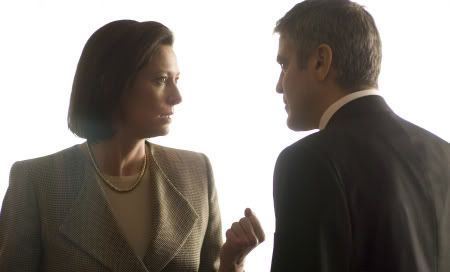
Tony Gilroy's "Michael Clayton" is one of the best and little seen films of the year. The plot cannot be summarized in one sentence, although its fairly simple in its most reduced terms, and the advertising was poor and did not accurately or attractively allure the masses to what is a very perspicacious and thrilling film about greed, corruption, and corporate responsibility. It's not child's fare but it doesn't pander or pat its audience on its head with its intelligence. "Michael Clayton" is a finely crafted film that I know a few friends have no desire to see probably due to the already mentioned advertising and plot issues. However, there are many reasons to see the film and I hope with all of the award attention its receiving more people will see it. Here are three reasons why you should "Michael Clayton."
1. Tony Gilroy
Tony Gilroy's early screenwriting credits include such dubious popcorn blockbusters as "Armageddon", "Proof of Life", and "The Devil's Advocate." It would be easy to write him off immediately after those titles, but there's a development in his voice that has lead him to be someone who has something to say about the world and yet make it utterly appealing in its universality. "The Bourne" series, of which he wrote all three, were films that crackled with breakneck car chases, fight sequences that enthralled, and explosions that were big and mighty, however the film's hero was, and to some degree, still on a journey to discover his identity and make good with the world. Jason Bourne has a clear conscious and strict moral code that he abides by with every brooding and quiet stare. There's a curiosity there that Gilroy pushes further in "Michael Clayton", his official directorial debut. It's such an assured and astute debut that it feels like he's been directing his entire career and has been burning to tell us something we need to hear. Michael Clayton, the character is a man caught in a bind where the world he lives in and the work he performs is ambiguous in its intentions. He covers up the wrongdoings of the big bad boys at his law firm, but he realizes he has a responsibility with that duty and uses it to expose the corruption at a big time corporation that has been responsible for the deaths of many and an attempt as his life as well. It's such a well written and balanced look at how we are now. No one is exactly good or bad anymore, but in the imaginative playground of film, Gilroy apes for a time when if given the opportunity we would choose to do the right thing.
2. Tilda Swinton
Cate Blanchett may be the auteur muse and fashion chameleon at the moment, but let's not forget about Hollywood's other alien beauty, Tilda Swinton. Her role as Karen Crowder in "Michael Clayton" is an interesting step for the actress who is more known for her independent film work. Her screen presence, which is based so much on her unusually striking physicality, reacts palpably with the movie's charming male lead, Mr. Clooney. She's not a classic beauty, but their story is not a romance, nor would that matter because they match quiet well in the film in the two or so scenes they share. It's a big film where she is not shrouded in theatrical costumes or a habitant of a fantastical otherworld. She is the modern day woman trying to establish herself along with the big boys at a major corporation. Although her character is a bit of an archetype--icy, bound to her work more than her life, a lover of boxy power suits--Swinton imbues the character with a certain weight that gives her a life beyond how she is defined by her job. The facial ticks and body movement Swinton employs during two great sequences in which we watch her prepare for a series of rehearsed speeches that cover her company's ass, and possibly her own, are fascinating to watch in their jumpy and revealing quality. She pulls her shaper over her tummy, winces at the sound of her own voice, adjusts her suits to fit just right, attaches an earring to her lobe ever so gently. There's an unspoken acknowledgment of the evil she is participating in that makes her character human and watchable. It's not sexy or pathetic but an honest and voyeuristic moment where everything we need to know about her character is expressed on that alabaster face. This was an odd year in film for women, particularly in American film, but this is one of the few great performances of the year that questions and gets at what it means to be a woman trying to have it all and what price there is to pay.
3. The opening and end credits
"Michael Clayton" begins and ends like a Michelangelo Antonioni film. There's a fine attention put on the meaning of space and the objects relative to their space at the beginning and end of the film that looks like something I haven't seen in a while. The film opens with an incendiary voice-over juxtaposed against very composed shots of Manhattan architecture, the contents on a desk, the wheel of a mail cart that increase in their edited intensity. The malaise of work, power, and white collars settles in quickly and with great fervor. Gilroy wants us to look at all of these things and ask what do they mean. Are we nothing but walls, pencils and pens, half empty coffee mugs? Is this the new beast that we have become part of? The deviation continues after the first few minutes. Clooney doesn't show up for almost another ten minutes, Swinton is profusely sweating in a bathroom stall, and Sydney Pollack is pissed about something. It's dizzying and on the verge of pure abstract. As a complement to the frenetic opening, "Clayton" ends in such a calm, sublime way that it's almost unbelievable how the film opened. I won't reveal what happens at the end but the last scene is punctuated with another great understanding of the power of space and object. The audience watches one of the film's stars have a moment of repose as the credits roll next to their satisfied visage. It's one of the best and unexpected ways to end a film.
Go see this movie.
Monday, December 17, 2007
in defense: michael clayton
Posted by
w.
at
10:14 AM
![]()
![]()
Labels: awards, film, george clooney, lists
Subscribe to:
Post Comments (Atom)



No comments:
Post a Comment